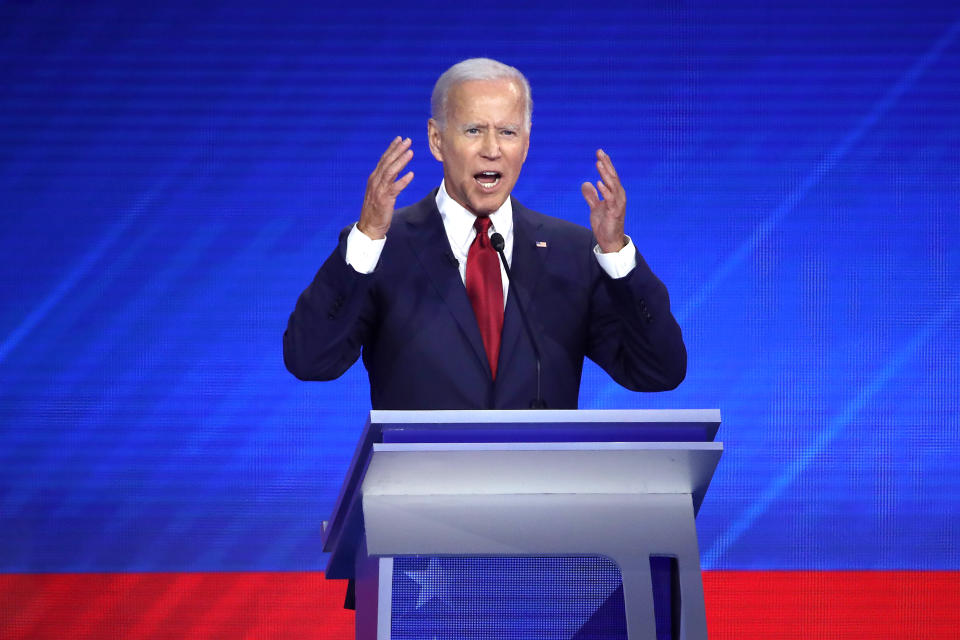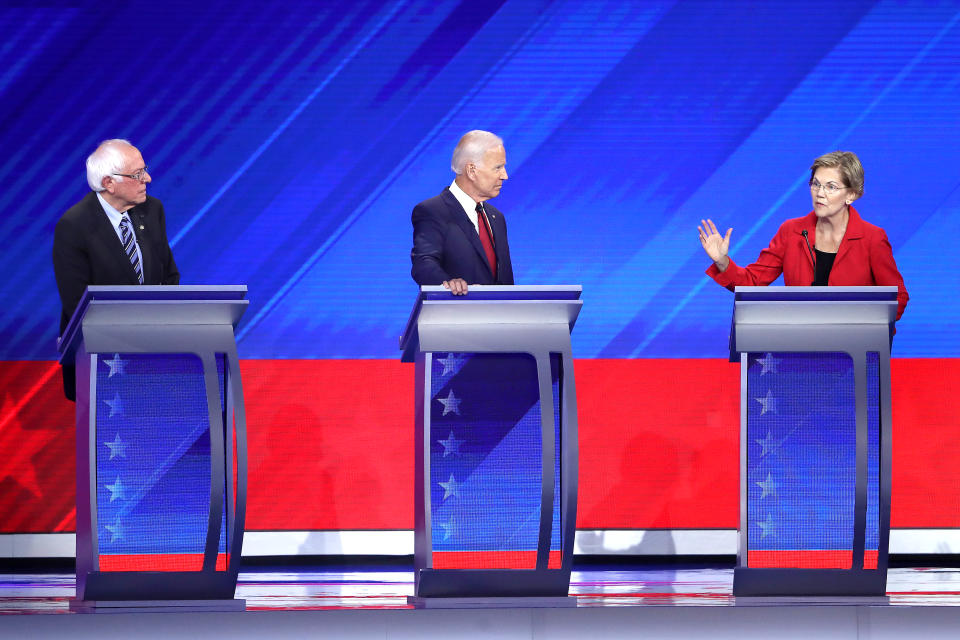5 key takeaways from the Democratic debate
Thursday night’s Democratic primary debate was the first to bring all of the top contenders together on one stage. Former Vice President Joe Biden, still leading in most polling, was flanked by Sen. Bernie Sanders and Sen. Elizabeth Warren, the candidates who have established themselves as his closest competitors. The ABC and Univision moderators were happy to let the candidates spar on health care, national security and trade, although the topics of the federal judiciary and abortion didn’t come up over the course of the evening.
Here are five key takeaways from the three hours in Houston.

1. Biden still under fire
The polling leader had moments when he appeared to stumble in the previous two debates and Thursday night was no different. He had an odd interjection when discussing health care with Sanders, stating “This is America” when the socialist senator from Vermont cited the United States’ high health care costs compared to Canada. He said the Obama administration never held immigrant children behind fences nor separated families, both statements that are untrue. Julián Castro needled Biden repeatedly, charging the former vice president “wants to take credit for Obama’s work but doesn’t want to answer questions.” Biden misspoke in saying nonviolent crimes shouldn’t result in jail time, which an aide corrected during the debate to say he meant nonviolent drug crimes.
Near the end of the debate, Biden answered a question about the legacy of slavery and segregation with a rambling discourse that touched on mortgage policies, teacher salaries, parental responsibility and circled around to Venezuela.
Biden: “Well, they have to deal with — look, there’s institutional segregation in this country. And from the time I got involved, I started dealing with that. Redlining, banks, making sure we are in a position where — look, you talk about education. I propose that what we take is those very poor schools, the Title I schools, triple the amount of money we spend from $15 to $45 billion a year. Give every single teacher a raise to the equal raise of, getting out—the $60,000 level. Number two, make sure that we bring in to help the teachers deal with the problems that come from home. The problems that come from home, we need — we have one school psychologist for every 1,500 kids in America today. It’s crazy. The teachers are — I’m married to a teacher, my deceased wife is a teacher. They have every problem coming to them. We have to make sure that every single child does, in fact, have 3, 4 and 5-year-olds go to school. School. Not day care, school. We bring social workers into homes and parents, to help them deal with how to raise their children. It’s not that they don’t want to help, they don’t know quite what to do. Play the radio, make sure the television — excuse me, make sure you have the record player on at night, the phone — make sure that kids hear words, a kid coming from a very poor school — a very poor background will hear 4 million words fewer spoken by the time they get there. There’s so much –”
Moderator: “Thank you, Mr. Vice president. “
Biden: “No, I’m going to go like the rest of them do, twice over. OK? Because here’s the deal. The deal is that we’ve got this a little backwards. And by the way, in Venezuela, we should be allowing people to come here from Venezuela. I know Maduro. I’ve confronted Maduro. Number two, you talk about the need to do something in Latin America. I’m the guy that came up with $740 million, to see to it those three countries, in fact, changed their system so people don’t have a chance to leave. You’re all acting like we just discovered this yesterday. Thank you very much.”
“Here in Northville, MI, people weren’t particularly taken aback by the Biden quote on segregation,” wrote BuzzFeed reporter Molly Hensley-Clancy, who was watching with the local Democratic club. “But they started shouting ‘What?!’ as his answer went on, eventually drowning him out in laughter.”

2. Warren cruises
While Biden struggled at times, the senior senator from Massachusetts turned in another brisk performance in the city where she finished her undergraduate degree. Warren was seldom challenged and she deflected the charge that her health-insurance plan would require a middle-class tax increase by criticizing insurance industry profits. Warren also continued her practice of tying policy discussions to her personal history, bringing up her time as a public school teacher when education policy was the topic. In a night that turned contentious at times, she avoided directly criticizing her fellow candidates at length and was second in having the most speaking time, behind only Biden.
3. Is Beto back?
Following the mass shooting in El Paso last month, former Texas Rep. Beto O'Rourke returned to his hometown to offer support to victims, and rebooted his struggling presidential campaign with a focus on gun control. And it paid off at the debate in Houston, where O'Rourke delivered a solid performance amid praise from his rivals for his handling of the attack.
O'Rourke was asked if he would stand by his call for a mandatory government buyback program for assault rifles.
“Hell yes, we’re going to take your AR-15, your AK-47,” the former Texas congressman shouted to cheers from the audience. “We’re not going to allow it to be used against our fellow Americans anymore.”
The O'Rourke campaign blasted out an e-mail to supporters with the subject line: “🔥🔥🔥Beto so far 🔥🔥🔥.”
"Beto is standing out in a BIG way — speaking with clarity, honesty, and passion about the epidemic of gun violence," the e-mail read. "Our website traffic is surging, folks on social media are stoked, and we think this could be a big moment."
The campaign even produced a T-shirt to capitalize on his performance.
Hell yes, we're going to take your AR-15.
Buy your shirt now: https://t.co/kEJxoLvfH5 pic.twitter.com/KKpAKX4IL8— Beto O'Rourke (@BetoORourke) September 13, 2019
4. Buttigieg recalls coming out
South Bend, Ind., Mayor Pete Buttigieg is the first openly gay presidential candidate in U.S. history. And on Thursday night, Buttigieg spoke about coming out for the first time on a national debate stage.
At the end of the debate, each of the candidates were asked to talk about a moment of resilience.
Buttigieg began his answer by saying that as a military officer serving under the “don’t ask don’t tell” policy and as an elected official in Indiana when Mike Pence was governor, he wondered whether openly acknowledging his sexuality would “be the ultimate career-ending professional setback.”
“I came back from the deployment and realized that you only get to live one life,” Buttigieg recalled. “And I was not interested in not knowing what it was like to be in love any longer, so I just came out.”
Buttigieg came out during his reelection campaign for mayor in 2015. He was reelected with 80 percent of the vote.
“When I trusted voters to judge me based on the job I did for them, they decided to trust me,” he said. “What I learned is that trust can be reciprocated. And part of how you can win and deserve to win is to know what’s worth more to you than winning. And I think that’s what we need in the presidency right now.”'
While it was a first for Buttigieg on the debate stage, the 37-year-old has talked about being gay on the campaign trail, often appearing at rallies with his husband, Chasten Buttigieg (the couple married in 2018).
Pete Buttigieg: "I came back from the deployment and realized that you only get to live one life and I was not interested in not knowing what it was like to be in love any longer, so I just came out." https://t.co/INdRXlIwFs #DemDebate pic.twitter.com/QXEgmjcm8d
— ABC News (@ABC) September 13, 2019
5. Houston, we have a bad joke problem
On a lighter but not necessarily funnier note, many of the candidates deployed jokes, with varying success. Klobuchar made a “Houston, we have a problem” crack in her opening statement, referencing the NASA drama “Apollo 13.” Yang said he knew a lot of doctors because he was Asian. Booker noted that the translation of “no” into Spanish was “no,” which actually earned some legitimate laughs. Harris attempted to compare Trump to a character from a beloved 1939 film.
“The bottom line is this: Donald Trump, in office on trade policy, you know, he reminds me of that guy in ‘The Wizard of Oz,’ you know, when you pull back the curtain, it's a really small dude?" Harris said, laughing at her own joke.
The guy behind the curtain in “The Wizard of Oz” is ... the Wizard of Oz.
Read more debate coverage from Yahoo News:




